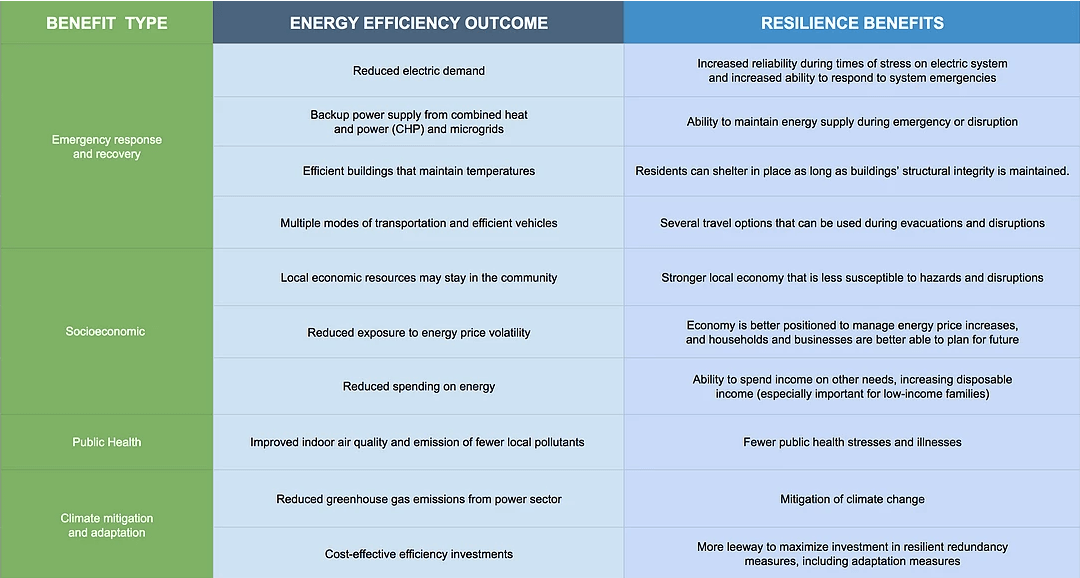Extreme weather events and natural disasters such as floods, forest fires, polar vortexes, and hurricanes are wreaking havoc on buildings, the electric grid, and other critical US infrastructure. In the wake of these events, many people are wondering about the resilience of our systems.
How can we make our systems more resilient?
This question is extremely important, but with no common definition of resilience, answers vary widely. Resilience is often viewed as a system’s ability to withstand and recover from serious events. This broad definition can be applied to an individual facility, an energy system, a city, economic activity, or even a region.
Energy efficiency and resilient infrastructure
ACEEE has begun to examine how energy efficiency intersects with the need for more resilient buildings, facilities, cities, electric grids, and other systems. For example, efficiency measures better retain indoor temperatures and improve building comfort, which is particularly important during storms or other weather events that can cause outages. These measures are important in critical infrastructure like hospitals, schools, and other buildings that might be used as shelters.
Here’s a sneak preview of some new ACEEE resources related to efficiency and resilience. Topics include community planning, distributed energy resources, and grid operations.
Community resilience and rebuilding
City planners are fundamentally concerned with reducing and responding to threats to their communities’ homes, hospitals, businesses, and transportation systems. This includes short- or long-term losses of power due to extreme weather. A 2015 ACEEE report looked at the resilience benefits of efficiency measures (see table below) and the ways that local resilience planners can incorporate them. Coming later this year, ACEEE will publish a review of city resilience strategies from around the world to better understand how cities plan to improve the energy efficiency of buildings and transportation sectors, to pursue clean energy and energy storage, and to remedy energy- and transportation-inequity.
Source: https://aceee.org/research-report/u1508
The role of energy efficiency in rebuilding
Energy efficiency can also play an important role in near-term post-disaster rebuilding plans. In a blog post, we looked at how efficient energy systems like combined heat and power (CHP), microgrids, and district energy systems can be part of rebuilding efforts to provide customers with reliable and affordable energy. We recommend that state and local policymakers recognize the benefits of energy-efficient measures and systems and do more to enable them.
Resilient Distributed Energy Resources
Our report, Valuing Distributed Energy Resources: Combined Heat and Power and the Modern Grid, suggests ways stakeholders can do more to promote those systems. While we know that distributed energy resources are often more resilient than traditional generation, they still make up only a small portion of the nation’s energy infrastructure. This report describes how facilities, communities, utilities, and others affected by poor energy resilience can better assess the costs of disruptive events and the benefits of mitigation strategies. We also suggest a proposed framework for measuring the resilience value of distributed energy resources.
Grid resilience
In 2017, the Federal Energy Regulatory Commission (FERC) began a process, continued through this year, to examine resilience in the utility sector. The agency turned down a US Department of Energy (DOE) proposal aimed at subsidizing nuclear and coal energy plants as baseload resources to improve the resilience of the US energy system. Instead, it asked grid operators to define resilience and identify issues that are threatening it. For grid operators, this discussion is both nuanced and technical. In particular, they must consider how reliability — a term that is clearly defined by the North American Electric Reliability Corporation and comes with strict performance standards and requirements — fits into broader grid resilience. For example, grid operators and FERC are working on changes to wholesale energy markets, which are used to meet reliability requirements.
Role of energy efficiency in creating grid resilience
Energy efficiency also plays a key role in maintaining grid reliability, including as a resource in wholesale capacity markets and as a response to electricity crises. Recognizing the value of efficiency for grid reliability is important within the national dialogue around our resource mix and resilience. In an upcoming topic brief, ACEEE will look at how utilities value reliability and resilience in energy efficiency cost-effectiveness testing.
Defining system resilience
Federal agencies, state regulators, grid operators, cities, and other stakeholders are all grappling with how to define and manage system resilience. Energy efficiency plays a critical role at each of these levels, and our publications aim to ensure that efficiency takes center stage in the discussion. Stay tuned!
